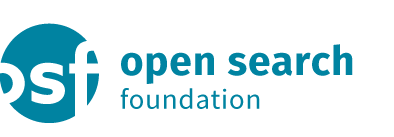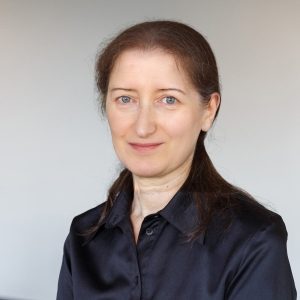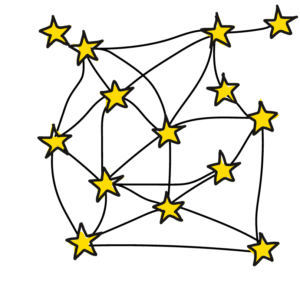“There are no search services, which I could tailor to my needs”
Interview with Dr Megi Sharikadze, research manager at Leibniz Super Computing Center (LRZ), member of the osf working group tech and member of the management team of openwebsearch.eu.
Interview: Susanne Vieser
Scientific results, calls for research projects, laws and political frameworks for applications: Dr Megi Sharikadze, an employee at the Leibniz Supercomputing Centre (LRZ) in Garching near Munich, is constantly on the lookout for news and information, both professionally and privately. This can be done quickly and easily online – but the manager and scientist is often not satisfied with the results.
“There are no individually personalized search services, which I could further tailor to my needs”, complains Sharikadze. “Unfortunately, I cannot be sure that the selection of search results provided to me happened objectively, that selection and ranking are not biased with commercial interests and partnerships”. The research manager has been involved with the Open Search Foundation (OSF) for several years in an effort to enrich online information searches and make them more value-based. Together with her colleagues, she pushed forward the European research project OpenWebSearch.EU, in which both the OSF and the LRZ are involved now. Megi Sharikadze is now able to combine her personal and professional interests. An interview about web search and its future.
How did you get in contact with the OSF?
Dr. Megi Sharikadze: My open search path started in September of 2018 when I participated in the EnviroInfo conference which was hosted at the LRZ. As Stefan Voigt from the German Aerospace Center or DLR has introduced the open search idea to participants there. I felt that this is a topic of my concern, too. I approached him and since then, we had several fruitful discussions, plans and iterations. Eventually, I have joined the Open Search Foundation.
Why are you engaged?
Sharikadze: Decision is a choice selected from viable solutions, which are based on information acquisition and analysis. If acquired information is not obtained objectively but selectively, being filtered with unknown criteria, then decisions are not based on a full objective ground. I believe in rational decision-making: I want to gather the relevant information, identify alternatives, evaluate the pros and cons of each option, and choose the best one based on objective criteria. That is why I am committed to Open Web search initiative.
You have a master’s degree in Biology and a PhD in Neuroscience, now you are working as a coordinator on various research projects at LRZ – what do you use web search for typically?
Sharikadze: My research career is in Biology, Neuroscience and Experimental Psychology. After graduation I went into the direction of science management and research coordination. Whether as a researcher or as a science manager, I always look for scientific publications and other relevant factual information, official documents, scientific and policy papers, grant calls and funding opportunities. At the beginning, I looked for information in the printed media, now mainly in the world wide web. My search space is multifaceted not only topic- but also language-wise and I often find myself being not satisfied with the search outcomes. So, I wish for improvements but I also actively push forward to reach such improvements.
What leaves you unsatisfied and what do you wish for when it comes to better web search?
Sharikadze: Very often I am not happy with the results and it is not a surprise while there are no individually personalized search services, which I could further tailor to my needs. I am aware that my search needs are not the most common, but I think there are many persons like myself, who would largely benefit from more advanced search options. I am sure that high satisfaction in internet search can be reached when users are provided with various search options and tailoring possibilities. I do not see this user-centrism in currently available services. Lack of General Data Protection Regulation or GDPR conformity, is another major issue. Unfortunately, I cannot be sure that selection of search results provided to me happened objectively, that selection and ranking are not biased with commercial interests and partnerships. With this in mind, I use various search sources not relying on one provider. I also check various pages which could be relevant to my search topics and look if I can find more relevant information in the special, theme-devoted webpages. I locally save the important relevant web-addresses and links on my computer organizing them as an offline index within my personal knowledge management system.
Do you have more tips for us?
Sharikadze: It is a failure to think that the needs of millions of online users can be addressed by identifying a small set of standard customers and tailor services to their needs. There are many outliers in the population and filtering them is perhaps good, for easiness of business, but this leaves needs of many stakeholders unmet and makes web search purely based on business-interests. Now with disruptive AI technologies, things are moving forward at high-speed. ChatGPT and similar models are already changing the situation in the web search landscape. I am afraid that from today to tomorrow our usual search strategies can be outdated. At this moment, I do not have specific tips to give on web search. Generally, I would not advise to let one provider of search services to be dominant in your daily practice. One should use a multitude of them but pay special attention to their cookie policies. When you strive for objectivity it is dangerous to rely on information conveyed by one provider – you can miss many facts, if “search result transporter” is selectively loaded.
In which working group do you engage at the OSF? What do you want to reach?
Sharikadze: I am affiliated with the tech working-group as I would like to understand the technologies behind the search. I am not a developer – I support Open Search Foundation in science- and project management and coordination. I continually look for new funding options to accommodate ideas of our experts in a funded project. In the foundation I mainly serve as a science manager, as a certified EU Liaison Officer, together with my co-thinkers from tech, legal, economic, educational and other domains, I coordinate proposal writing activities of future European and other collaborative projects.
Now you are also working for the European OpenWebSearch.EU project: What do you do for it?
Sharikadze: As a result of essential joint efforts, personal commitment and continually active modus operandi, our ideas have been realized in the OpenWebSearch.EU project which has won EU funding for 3 years. The project pilots the core of a European Open Web Index, for the sake of open human-centered search engine market promotion. I am leading the Project Management and Coordination Office, PMCO, and am involved in research coordination, management and business development related activities together with Michael Granitzer, Professor at the University of Passau, and Stefan Voigt from the Open Search Foundation and DLR. Among others, I am involved in aspects such as international cooperation, sustainability, governance and business model development.
How is it going?
Sharikadze: We all are happy in the project as we foresee how our ideas are now translated in the European value-based open-search solutions. For these reasons, seeing that the OpenWebSearch.EU project is successful is very important to us. We pay utmost attention to the project and partners and strive for optimal execution, reaching planned goals and aims in a timely manner. My PMCO work-package is also responsible for planning and execution of so-called third-party calls. We planned 15% of the budget for funding of third-party, community projects. We are moving forward: the first round of applications has been closed. We are currently sifting through proposals, and we are happy to see exciting ideas coming along.
A freely available web index is created in European teamwork: What do you expect from an open search and which search service do you want personally?
Sharikadze: I expect that European teamwork leads to European alternative solutions within the open search engine market. Together with my co-thinkers I do my best to support this process. A resilient, trustworthy and sustainable internet – the Next Generation Internet, featured with human-centered specialized law-conform solutions for Open Search would be my personal wish come true.
Dr Megi Sharikadze
Member of Open Search Foundation
+ tech working group
Research manager at Leibniz Rechenzentrum
Head of PMCO, of ows.eu


